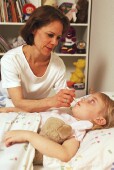
MONDAY, May 3 (HealthDay News) — A new study suggests that parents often make mistakes when they give medicine to their chronically ill children.
“Giving these medicines in exactly the right way is vital and sometimes lifesaving for children with chronic conditions,” said study lead author Dr. Kathleen E. Walsh, assistant professor of pediatrics at University of Massachusetts Medical School, in a statement.
The study authors reached their conclusions after visiting the homes of 83 chronically ill children and adults aged 6 months to 20 years. The patients had cancer, sickle cell disease and epilepsy.
The researchers checked on 544 drugs and watched 166 drugs being administered. Two doctors followed up by analyzing the results.
The study reports that mothers gave medications 79 percent of the time, while fathers only did 7 percent of the time. Other guardians administered medication 14 percent of the time.
Despite a high education level among parents, with 37 percent having bachelor’s degrees and 12 percent holding advanced degrees, mistakes happened often. “For example, we visited families who did not use the proper syringe to measure liquid medicine or a pill cutter to cut tablets, resulting in children getting too little pain medicine or chemotherapy,” Walsh said.
Researchers noted 128 medication errors, including incorrectly labeled chemotherapy drugs and insufficient doses of painkillers. Of those mistakes, 73 could have hurt children, and 10 actually did injure kids. (One mistake resulted from an incorrect chemotherapy dosing label, which called for six tablets a day when the child was supposed to have seven a week.)
The researchers write that parents need help administering complicated drug regimens, even if they’re highly educated. “If parents or caregivers are not sure exactly how to give the medicine, they should ask their child’s doctor,” Walsh said.
The study is to be presented Monday at the Pediatric Academic Societies’ annual meeting in Vancouver, Canada.
More information
Kidshealth.org has more on illnesses facing children.

